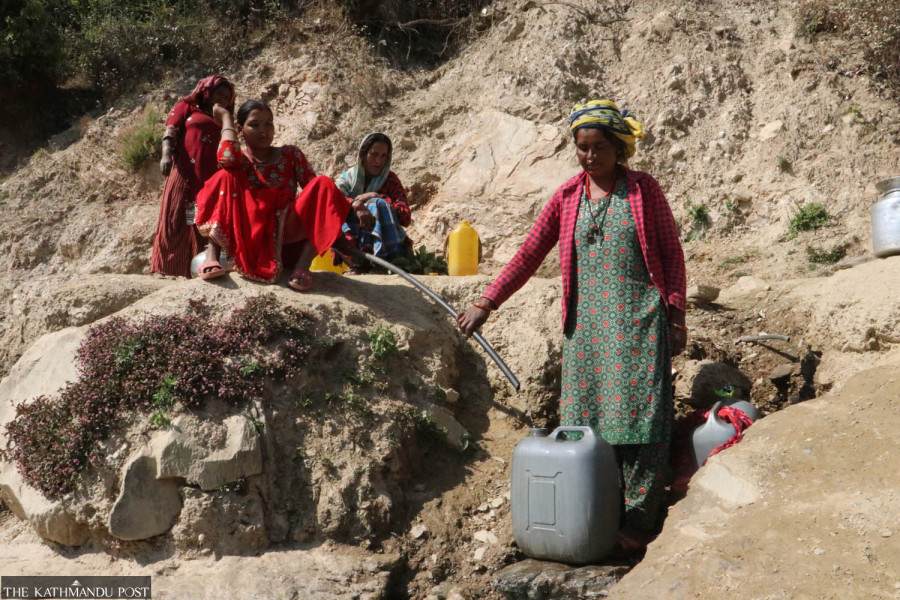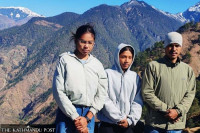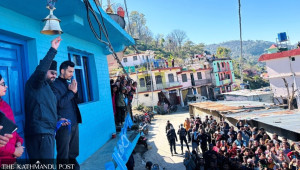Sudurpaschim Province
Just one trickling tap for 58 households and 500 students
Fed up with water shortage and unfulfilled promises by politicians, residents of Dallekh village in Doti plan to boycott upcoming elections.
Mohan Paneru
Dallekh village, located in ward 6 of Sayal Rural Municipality in Doti district, is reeling under acute shortage of drinking water.
Dallekh is home to two settlements comprising 58 families. A rough and unpaved road cuts through the middle. Eighteen Dalit households live above the road and another 40 families reside below in Saunkanda. To make matters worse, more than 500 students of the nearby Himalaya Secondary School also depend on the same limited water source.
All of them—the local residents and students—are forced to rely on a single small water tap, which supplies 10 liters of water every 20 minutes. The water tap, fed by a pipe from a distant hill, is located near the roadside.
Villagers complain that reaching to the tap and fetching just one gagri (water container) of water can take over an hour. For local residents like Bhaghu Damai of Dallekh, the daily routine revolves around this single source. “It’s the only tap for two entire settlements and a school. We have to wait in line for three to four hours just to get a turn. Only those who arrive by 4 am can fetch water early,” she said, adding that their repeated pleas to ward and rural municipality officials have gone unanswered.
The pipe system, installed through community effort, supplies water from a highland spring which lies on the way to Khaptad and distributes it to two settlements and the community school. The schedule is tightly managed—mornings and evenings are reserved alternately for the settlements, while the school receives water during midday.
According to Tara Damai, a resident of the Dalit settlement, at least one family member spends most of their day just queuing for water. “We’ve been ignored for too long. It feels like they don’t even consider our community part of the village,” she said. “This water isn’t just for drinking. It has to meet all our sanitation needs and we must also share it with our livestock.”
While the monsoon season offers some relief, the problem becomes more severe during the dry season due to the lack of alternative sources. Hemraj Dahal, principal of Himalaya Secondary School, said the issue is directly affecting education. “Water scarcity is a daily disruption. Students are often distracted or late because they help their families fetch water. We’ve informed the authorities, but nothing concrete has happened yet,” he said.
Residents express growing frustration with politicians who make promises during election campaigns but fail to deliver. “During elections, they promise roads and water taps in every neighbourhood,” said Tuli Damai, another woman who was met while waiting in line for water. “But once elected, they forget us and our hardships.”
The locals of the Dalit settlement have come up with a plan—not to vote in the upcoming elections in 2027 if the water crisis remains unresolved. “This time, we’re launching a campaign: we will vote only for the candidate who ensures water supply before the 2027 elections,” said Parbati Damai, another woman from Dallekh.
The people’s representatives admit that Dallekh village has had a water crisis for years. Dharma Raj Joshi, chairman of Sayal Rural Municipality, acknowledged the gravity of the issue and assured that efforts have been initiated at the provincial and federal levels. “This year, we’ve submitted a proposal to both provincial and central governments. Last year, ward 2 faced a similar crisis and received Rs8 million for a drinking water project. Work has already begun there and we’re hopeful we can implement a similar plan for Dallekh in the coming year.”
Until then, the villagers of Dallekh must continue to wake before dawn and spend hours every day managing water.




 11.12°C Kathmandu
11.12°C Kathmandu















